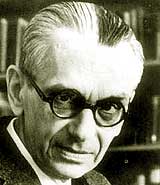
In my earlier blog on this year's Miami Book Fair, I promised to report back after I read Rebecca Goldstein's book, Incompleteness: the Proof and Paradox of Kurt Gödel, and let you know if it could actually be comprehended by a non-mathematician. Well, I've read it, and the answer is ... kind of.
Even though my mind rebelled at the limited amount of logical notation that was included, I did grasp at least the general outline of what Gödel did. And even that was enough to amaze me with its wizardry, and to give me some small appreciation of the import of his accomplishment.
The best way for me to present my take on it is to start with another author and another interesting mind. In his book, Hackers--Heroes of the Computer Revolution, Steven Levy quotes the early MIT pioneer of computer programming, Bill Gosper, as saying, "Data is just a dumb kind of programming."
This opaque proclamation, seeming to make pretensions of being deep, is really just a concise way of saying that there is no difference in a computer between a byte of program code or a byte of data, except for the context.
A computer that attempts to "run" data, executing it as a series of instructions, will certainly "crash," since the data will not conform to the precise requirements of the codes and sequences which are the syntax of the logical language of the program. Equally, a program trying to read a stream of data will likely reach the same impasse if it suddenly encounters program codes instead--the codes would not conform to the expected type of data.
Programmers know that both of these situations occur frequently as a result of logical glitches that cause the program to look in the wrong memory location for its next instruction or next piece of data.
But now imagine a computer in which data is also programming, and vice versa. This analogy is as close as I can come to understanding the method that Kurt Gödel used in his proof of "incompleteness." He devised an ingenious system of formal logic in which the statements are simultaneously logical and arithmetical--they have logical meanings and also numerical identities.
Using this system, he proceeded to show how any logically provable statement in it had a certain mathematical characteristic. So he could mathematically analyze any statement and determine if it was provable or not.
Finally, he was able to show that certain statements which are demonstrably true (because their arithmetic works) can also be proven to be unprovable (because they don't have that telltale mathematic signature of the provable ones).
If this isn't enough to bend your mind, you must already have a mind with a mathematical bent (!) and be able to imagine this with greater perfection than I can. In fact, you may have studied Gödel himself, in which case you should write to explain how I have got it all wrong. But I think, because of what Gosper said about data and programming, that I can get a glimpse of how this would work.
What it means is that Gödel created a logical system in which numbers are simultaneously logic. Code and data are one and the same, and function together to measure what is true and what is provable.
Note that truth and provability are two separate issues here. That is both the nature of the tool that Gödel used in his proof, and also what he set about to prove: that truths will always exist that we cannot logically prove. Like Plato, he believed that Truth exists quite apart from whether we can prove it, or whether we even know about it. Truth is a priori, before experience.
Most amazing about all this is that the implications of his proof (which, not being mathematicians, we will have to take on their word) reach beyond the "sandbox" of the formal system he created, beyond mathematics and logic itself, into the realm of philosophy and metaphysics. It says, provably and conclusively, that no matter what we do there will always be truths that we cannot prove are true. This cuts to our most fundamental experience as living, conscious beings--the abundant obviousness that Something exists, that we are part of it, somehow identical with it, though we will be forever unable to prove the What and Why of it, or even that we did not imagine the whole thing.
Some trick, huh? The idea that mathematics can have something so profound to tell us about our lives is incredible and almost unprecedented.
Near the end of the book, in a wonderful sidelight on Gödel's personality, Goldstein relates what happened as he was preparing for his U.S. citizenship examination. Ever the diligent student, Gödel made a thorough study of the Constitution and was startled to discover a logical flaw in it which, it seemed to him, would allow the democracy to degenerate into tyranny!
Alas, the details of this insight, like the legendary Fermat's Proof, were never recorded even by the people who told the story, and so it has been lost to posterity. Since we will be unable to patch the error with legislation, it remains for us to live out the proof. Only time will tell if Gödel left us with one more evidence of his genius.
Monday, December 26, 2005
Math and Magic
Posted by
The Nort
at
10:38 PM
![]()
![]()
Labels: mathematics, philosophy
Subscribe to:
Post Comments (Atom)









No comments:
Post a Comment